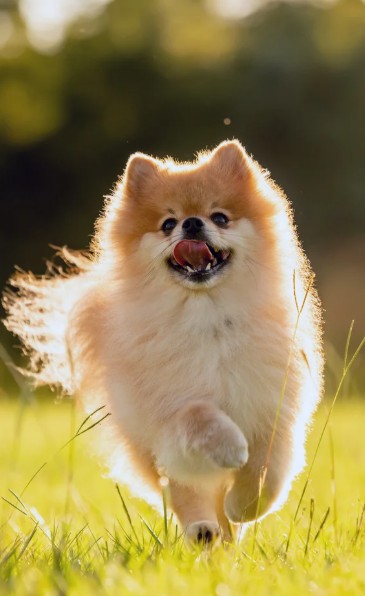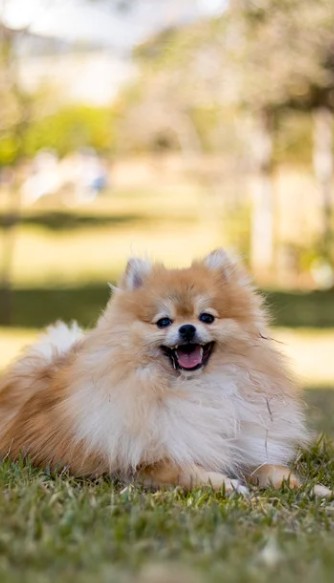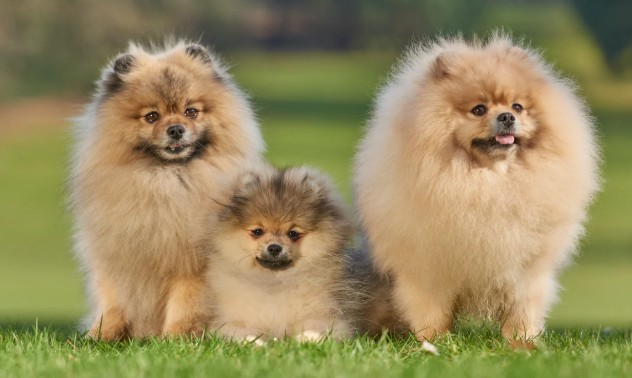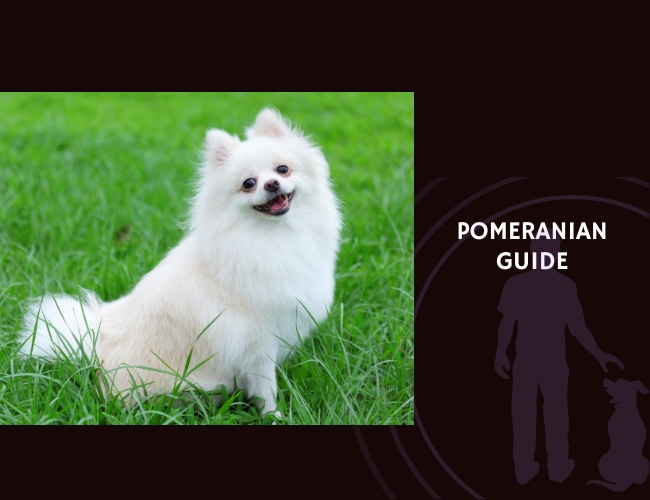Introduction to the Pomeranian Breed
Roots in the Spitz Family
Pomeranians are small but mighty, rooted in a rich canine history. They descend from larger Spitz-type sled dogs known for their strength and resilience in cold northern climates. Originally bred for tough work, these ancestors pulled sleds and played key roles as watchdogs in regions like Pomerania—a historical area on the southern Baltic coast. If you’ve ever wondered how such a small dog has such a big personality, it’s because their roots are anything but tiny!
Transformation into Loving Companions
Over time, breeders focused on making the Pomeranian more suitable for home life. Their size shrank, but their confidence and alertness didn’t. Through careful selection, today’s Pomeranians have become compact, fluffy companions. Despite their lap-dog reputation, many Pomeranians still carry the natural instincts of their Spitz forebears. This means they are watchful, loyal, and lively—perfect for families who want a dog that’s engaging and involved.
Why This Guide Matters
Whether you’re a long-time dog person or considering your first Pomeranian, this professional guide is here for you. We’ve packed it with supportive advice and informative, evidence-based tips. You’ll find answers to big questions (“How can I manage all that barking?”) and expert recommendations for everything from nutrition to behavioral quirks.
By understanding the breed’s fascinating history, you’re already a step ahead on the journey to a happy, healthy relationship with your new little friend. Ready to learn more about what makes Pomeranians tick? Let’s get started! 🧡
Character and Behavior Traits
Always on alert: the vocal communicator
Pomeranians might be tiny, but their spirit is anything but small. One of the first things you’ll notice about this breed is their high alertness. Pomeranians often act as little watchdogs, quick to let you know about every sound or new visitor. Their barking is more than just noise—it’s their main way of communicating excitement, warning of something unfamiliar, or defending their home. While their vocal nature can sometimes be a handful, it also means you’ll never miss a package delivery or a surprise visitor! 🐾
Deep bonds and loyal hearts
Pomeranians are famous for building powerful bonds with their primary caregivers. They absolutely love spending time in close proximity with their humans. Expect lots of tail wags, attention-seeking glances, and even following you from room to room. Their loyalty means they can be deeply affectionate, often wanting to be at the center of family life. This strong connection is heartwarming but can sometimes result in clinginess or anxiety when left alone.
Boldness in a small package
Despite their modest size, Pomeranians have strong territorial instincts. Their quick response to new sights or sounds, including barking or a defensive stance, comes from their ancestry as alert Spitz-type dogs. It’s not unusual for them to react strongly to strangers or even unusual changes in the environment. Sometimes, their confidence leads to overestimating their size, which can show as hypervigilance or defensive behavior.
Understanding these natural tendencies helps create a positive and supportive relationship with your Pomeranian. Next, we’ll explore ways to support their learning and growth through effective approaches that match their spirited personalities.
Effective Training Approaches
Using rewards to teach positive habits
Pomeranians are quick learners. Reward-based training works especially well for them. Instead of punishing mistakes, use treats and praise to encourage good behavior. Keep sessions short and fun to hold their attention. For example, a five-minute session with a few tasty treats can do wonders for teaching basic commands like “sit” or “stay.” Their eagerness to please and love for snacks makes these methods both enjoyable and effective. 🎉
Socializing from puppyhood
Early socialization helps your Pomeranian feel safe and friendly around new people and pets. Invite friends over, go on short walks in safe areas, and reward calm introductions. This lowers the chance of problem barking or nervousness when meeting strangers. Gentle, positive experiences in the first few months help your pup grow into a confident adult.
Teaching calm responses to the world
Pomeranians can easily get overwhelmed by new noises, people, or sudden changes. Emotional regulation training helps them handle excitement and stress. Start by exposing your dog to mild versions of triggers, like the doorbell at a low volume, while offering treats and comfort. If your Pom stays calm, reward them. Repeat as needed and slowly increase the challenge. This desensitization builds their emotional resilience.
Supporting your Pomeranian’s natural intelligence
Regular practice and lots of variety keep training fun. Use clickers, toys, or affection as rewards to keep your Pom excited about learning. Remember to always stay patient and cheerful—your encouragement means the world to these little companions. Positive reinforcement and early socialization go a long way in shaping a confident, happy Pomeranian.
With a solid training foundation, Pomeranians are more likely to thrive at home and out in the world.

House Training and Behavioral Management
Understanding unique challenges
Pomeranians, with their small size and lively personalities, present some unique house training needs. One major factor to consider is their small bladder capacity. This means they need frequent potty breaks, especially as puppies. Expecting young Pomeranians to hold it for extended periods can lead to accidents and frustration for both dog and owner. During extreme weather, they may also resist going outside, so planning indoor potty options like puppy pads is helpful.
Reinforcing calm behavior
Calm behavior does not come naturally to all Pomeranians. These dogs are alert and can be easily excited by small changes around them. To help your Pomeranian learn when to relax, reward them every time they are settled or quiet, not just when performing tricks. Simple gestures like calm petting and soft praise can reinforce what you want to see. Try to anticipate triggers—like doorbells or unfamiliar visitors—and guide your pet to a calm spot before excitement builds.
Teaching reliable recall
Pomeranians can be impulsive, especially when they see something interesting. Consistent recall training—teaching your dog to come when called—builds safety and trust. Use short, positive sessions with treats or favorite toys as rewards. Start in quiet spaces before adding distractions, making sure your dog learns recall is always a good experience.
Managing excessive barking
Vocalization is a big part of how Pomeranians communicate. While some barking is normal, excessive barking can become disruptive. Early socialization, desensitization to common sounds, and clear boundaries help keep this in check. Redirect your Pomeranian’s focus and reward quiet moments, using verbal cues like “quiet” paired with treats. Remember, patience is key! 🎉
By supporting gentle routines and understanding your Pomeranian’s natural tendencies, you create a peaceful home for both pets and people.
Nutritional Needs and Dietary Planning
Meeting high energy needs
Pomeranians may be tiny, but they burn calories fast! With their high metabolism, these dogs thrive on energy-dense diets tailored for small breeds. Look for small-kibble dry dog food especially made for toy or small breeds—this helps them eat comfortably and digest efficiently. It also fits their tiny mouths and encourages chewing, which is great for dental health. Adult Pomeranians generally need about forty calories per pound of body weight each day, while growing puppies need closer to fifty. Regular checks with your vet will make sure your Pomeranian’s food matches their age, activity, and health needs.
Portion control and weight management
Because of their petite size, even a small amount of extra food can tip the scale. Obesity can be a serious problem in Pomeranians, making precise portioning essential. Weigh your dog regularly and keep treats to a minimum. Split meals into two or three portions a day to help keep blood sugar steady—this also lowers the risk of hypoglycemia, which is a concern in puppies and underfed adults. Remember: a healthy weight supports strong joints and a long life!
Supporting that signature coat
Is your Pomeranian’s fur looking fluffy and vibrant? That famous coat needs more than brushing. A diet rich in omega-3 and omega-6 fatty acids, like those found in fish oil or certain quality dog foods, nourishes the skin and keeps the coat soft and full. High-quality dog food for small breeds often takes coat care into account, but your vet can always recommend supplements if needed.
Getting nutrition right sets your Pomeranian up for good health, energy, and that trademark show-stopping look. With a balanced diet, rest assured you’re giving your furry friend a great start each day!
Health Concerns and Common Issues
Skeletal health: tiny size, big attention
Pomeranians may be small, but they require serious care for their bones and joints. Two of the most common skeletal issues are tracheal collapse and luxating patella. Tracheal collapse means the windpipe weakens, which can lead to coughing or breathing trouble. Luxating patella is a kneecap that dislocates, often causing limping or a strange hopping walk. Dental overcrowding is also frequent in toy-sized dogs like the Pomeranian. Regular veterinary checkups help spot these conditions early for better management and comfort.
Skin and endocrine disorders: coat and hormones
Pomeranians are famous for their fluffy coats, but their skin needs special attention. Some experience alopecia X, also called “black skin disease,” which leads to hair loss and darkened skin. Another common issue is hypothyroidism. This hormone-related problem can cause a dull coat, skin changes, and weight gain. Veterinary support and consistent grooming routines are key for catching and treating these problems so your Pomeranian’s coat stays healthy and bright.
Watching out for hypoglycemia
Because of their high metabolic rate and small size, Pomeranian puppies and adults that miss meals are at risk of low blood sugar, or hypoglycemia. Signs include weakness, tremors, and confusion, and the condition can be dangerous if not addressed quickly. Feeding your Pomeranian regular, energy-dense meals and monitoring their behavior is essential, especially when they are young or stressed.
Understanding these unique challenges sets you up to support your Pomeranian’s health and happiness every day. Attentive care builds the foundation for a strong, trusting relationship with your companion.
Tiny Body. Towering Spirit.
Loud, proud, and always near.
Pomeranians may fit in your lap, but their personality fills the room—bold barkers, sharp minds, and unshakable loyalty.
Fluff meets fire.
Beneath the silky double coat lies a brave little guardian, always alert, always in tune with your every move.



Raise one right, and you’ll never walk alone.
With patience, structure, and love, a Pomeranian becomes more than a pet—they become your shadow, your spark, your heart on four paws.
Dental Health and Maintenance
Why dental care matters for your Pomeranian
When it comes to your Pomeranian’s well-being, keeping their mouth healthy is just as important as their shiny double coat or bouncy personality. Dental care isn’t only about fresh breath—poor dental health can lead to pain, infections, and other health problems that affect your pup’s whole body. For small breeds like the Pomeranian, dental overcrowding is common. This makes them more likely to develop plaque buildup and periodontal disease, both of which can cut short their life and happiness if left untreated. Staying on top of dental care is a big step to help your little companion feel and act their best every day.
Choosing the right food for dental health
What your Pomeranian eats can make a huge difference for their teeth. Look for high-quality, dry food with a crunchy kibble texture. The firm texture helps scrape away plaque naturally while they chew. There are also dental-specific formulations made to clean teeth and reduce tartar. If your Pomeranian prefers small bites, small-breed kibble is best because it’s easy for their tiny jaws to handle but still promotes chewing rather than gulping food. As a bonus, crunchy kibble supports their metabolism and helps manage their weight—a win-win!
Dental routines and professional care
Caring for your Pom’s teeth doesn’t have to be hard, but it does need to be consistent. Ideally, brush their teeth daily with a dog-safe toothbrush and toothpaste. For pups that aren’t fans of brushing, dental chews or toys designed to clean teeth are great alternatives. These routines can fight off everyday plaque, but professional cleanings at the vet are essential too. Your veterinarian can perform deep cleanings and check for problems hiding under the gum line. They’ll also track changes at each checkup, catching issues before they grow. Regular professional cleanings, paired with your at-home brushing, set your Pomeranian up for a long, healthy life full of happy smiles 😁.
Paying attention to dental health is a caring habit that helps your Pomeranian live life to the fullest. A healthy mouth supports their whole body, from their tiny paws to their wagging tail.
Creating an Optimal Living Environment
Making home a haven
Pomeranians are happiest when their environment fits their unique needs. They thrive as indoor dogs with supervised adventures outside. Their tiny size and lush double coat mean they are sensitive to extreme temperatures. During cold days, a warm indoor space and cozy bedding can make all the difference. In hot weather, ensure they rest in well-shaded, cool places—overheating happens quickly for these little pups. A moderate outdoor stroll on a pleasant day is perfect, but always keep watch for sudden shivers or panting.
Protecting from weather extremes
Since Pomeranians do not tolerate heat or cold well, limit time outside when it’s too hot or chilly. Rain jackets or sweaters help during winter walks, while midsummer outings are best done early or late in the day. Having a safe, enclosed yard or a secure area for potty breaks provides a great balance between activity and comfort.
Creating calm and consistency
A predictable routine calms Pomeranians’ alert minds. Keep feeding, walks, play sessions, and bedtime at the same times each day. Avoid loud noises and chaotic changes, as these lively dogs can get anxious if their world feels unpredictable. Provide a dedicated resting spot where your pom can retreat and recharge. Close human contact is a huge comfort—just being near their favorite people works wonders for emotional security.
A stable, climate-appropriate home is the foundation for your Pomeranian’s well-being. As you build daily routines and gentle boundaries, your small friend will feel safe, content, and ready for each new day. 🏡

Mental Stimulation and Enrichment
Keeping curious minds busy
Pomeranians have active, alert minds that love a challenge! Daily mental enrichment is as important as their physical care. If you have ever wondered why your Pomeranian seems to invent new games or explore every corner, they are simply following their strong natural drive for stimulation and discovery.
Puzzle toys & interactive games
Variety is the key to a content Pomeranian. Puzzle toys and interactive games are fantastic tools for giving their clever brains a workout. The best options engage problem-solving skills and reward persistence. Try food-dispensing puzzles, hide-and-seek games, or lightweight toys that make noise. These choices keep your Pomeranian busy when you are not able to give them your full attention — a little squeaky fun can go a long way! 🧩
Explore training sessions as playtime, too. Teaching a new trick, reinforcing recall, or practicing manners can be both mentally tiring and exciting for your pup. Make sure sessions are short and positive; Pomeranians love to learn, but only on their own terms.
Activity plus challenge
Mental and physical stimulation should support each other. Instead of relying solely on simple walks, incorporate gentle agility or scent-based games. Scatter their kibble around the room for a treasure hunt or use interactive feeders to slow down meals and spark curiosity. Balancing movement and thought helps burn off energy and prevents boredom.
Daily routines for emotional security
Pomeranians thrive on consistency. Try setting up structured routines, like morning play followed by quiet time or regular training after meals. Predictability helps prevent anxiety and reduces the likelihood of overexcitement or unwanted behaviors. If life feels calm and secure, your Pomeranian will shine with confidence and contentment.
With these supportive practices, you lay a strong foundation for a happy, well-adjusted companion. 🐾
Socialization and Emotional Support
Gentle socialization through all life stages
Pomeranians thrive when they are gently introduced to new people, places, and animals throughout their lives. Start with short, positive experiences as puppies to help them feel confident and safe. Expose them to a variety of sights and sounds in a calm environment, always using praise and treats to reinforce curiosity and bravery. As they grow, continue introducing them to new situations at their own pace. This approach helps minimize fear and prevents reactivity later on, setting the stage for a friendly and adaptable companion.
The value of close human contact
These little dogs build deep bonds with their primary caregivers and often seek close physical proximity. Your Pomeranian may prefer sitting right next to you or following you from room to room. Regular gentle touch, verbal reassurance, and predictable care routines help them feel secure and loved. Remember, sudden separations or unpredictable schedules can cause anxiety for sensitive Pomeranians, so consistency is key.
Creating a safe and predictable environment
Establishing routines and boundaries makes your Pomeranian feel safe. Provide a quiet spot for rest where they know they can retreat undisturbed. Keep feeding times and walks on a regular schedule. Try to keep big changes gradual, and use soothing cues—like a familiar blanket or favorite toy—to help them adapt. If loud sounds or new guests cause stress, offer comfort and a calm space where they can decompress.
Emotional support through daily interaction
Daily engagement, gentle play, and encouraging training foster emotional resilience. Communicating with patience and positivity supports their sensitive nature. When your Pomeranian displays uncertainty, guide them with soft words and gentle guidance rather than punishment. Over time, your bond grows stronger, and your dog’s confidence blossoms.
With a foundation of gentle socialization and consistent emotional support, your Pomeranian will feel secure at home—ready to enjoy each day by your side.
Lifespan and Long-term Care
Understanding your Pomeranian’s lifespan
Pomeranians are known for their impressive lifespan—many live between twelve and sixteen years. This longevity is a wonderful reward for devoted care but brings unique responsibilities as your dog moves through different life stages. Looking after your Pomeranian means adjusting routines and being mindful of their changing needs, from playful puppyhood to the peaceful senior years. 🐾
Factors that impact longevity
Your pet’s lifespan is shaped by several key factors:
- Regular veterinary care, including preventive health screenings, detects issues early and keeps your Pomeranian healthy.
- Good weight management helps avoid stress on their small joints and reduces risks for conditions like tracheal collapse and luxating patella.
- Oral health is important since dental disease is common; consistent dental care increases comfort and supports overall wellness.
- Quality nutrition, portion control, and regular exercise all strengthen resilience and can help your Pomeranian live a long, happy life.
- High-quality dog food designed for small breeds meets their unique needs, especially for energy and coat health.
Preventive care and routine checkups
Staying proactive with health checks is one of the best things you can do. Annual vet visits let you catch problems early. Ask your vet about monitoring for conditions like hypothyroidism, alopecia X, or risks of hypoglycemia in young or undersized dogs. Frequent weight checks and teeth cleanings should be part of your plan.
Adapting care as your dog ages
As your Pomeranian grows older, they may need more quiet time, softer foods, or extra support for mobility. Adjust their exercise and play as needed, swapping high-energy games for gentle walks or puzzle toys. Remember, a stable environment and lots of love are just as vital as daily routines.
Caring for a Pomeranian is a journey. Think of it as a partnership that evolves over time, requiring attention, flexibility, and patience as you nurture your companion’s health and happiness.
Conclusion: Is a Pomeranian Right for You?
Matching Lifestyle and Commitment
Thinking of welcoming a Pomeranian into your life? These pint-sized companions thrive in calm homes where daily attention and structured routines are the norm. If your household tends to be loud, hectic, or unpredictable, a Pomeranian may struggle with stress and excessive barking. Homes with predictable patterns and plenty of gentle interaction are a better fit for their sensitive, social nature.
Pomeranians need close proximity to humans and direct involvement in daily activities. This means they are best for people who can provide company throughout the day or who have flexible schedules. Leaving them alone for long periods can lead to anxiety or destructive habits.
Understanding the Time and Energy Investment
Although they are small, Pomeranians require a meaningful time commitment. They need daily cognitive games, short walks, play periods, and consistent training. Their beautiful coats demand regular grooming, and their vocal tendencies call for patient behavioral guidance. Veterinary care, dental hygiene, and dietary monitoring further add to the ongoing responsibilities.
Families and individuals must be prepared for a lifespan of twelve to sixteen years, with evolving health and social needs as they age. Regular checkups and preventive care become more important over time, and adapting routines keeps them comfortable in their senior years.
The Rewards of Pomeranian Companionship
Adding a Pomeranian to your household brings years of joy, affection, and lively spirit. Their loyalty, curiosity, and devotion make them cherished members of the family. When their needs are met, Pomeranians reward their devoted owners with endless love, fun, and companionship. If you seek a clever and loving friend who thrives on structure and affection, the Pomeranian can make your house truly feel like home. 🐾










